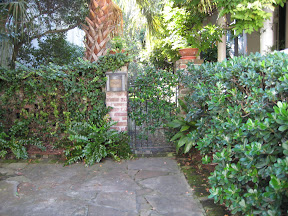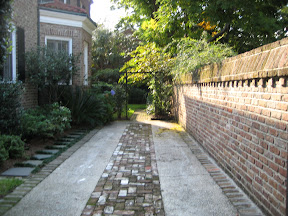Late Fall
A full day of leaf shredding has the 3-bin compost system full to overflowing. What a great feeling to have that done. Plenty more leaves will be falling, have fallen, since yesterday, but the rest will just have stay where they land, or maybe they'll blow across the street into the neighbor's yard. Or maybe the bins will settle down a bit and I'll be able to fit some more in... they seem to do that at this time of year.
I once wrote that I have the most complicated and inefficient compost area in the world. There's the 3-bin set-up, made of scrap lumber, that is intended to be filled from left to right, with the material turned to the right as it ages. Well, there's always more material waiting in the last bin when the first bin gets full, so there's a stand-by bin that I use for finishing the stuff - one of those round plastic bins that's supposed to allow you to add rough material to the top and remove finished compost from the bottom. Yeah, right, that might work in some alternate universe, but not in New England. Off to the side, there's a tumbler, for kitchen scraps. Also called a batch composter, it's the only way I know of to use food scraps and not end up feeding rodents. The tall aluminum legs can't be climbed, but even so I've had to nail hardware cloth (like fine-gauge, rigid chicken wire) over the larger openings to keep the critters out; apparently rodents are good jumpers. This unit becomes hard to turn as it gets full, so there's a holding bin for cooking batches of the stuff that's come out of the tumbler. That's one of the square plastic units, and it's wrapped all around with hardware cloth and set on thick concrete blocks to deter rodents. I can dump the tumbler into that about three times before it's full, adding a layer of dry garden waste on top of the slimy vegetable waste. Off-loading the tumbler is probably the messiest job in my garden; sometimes the olfactory sensation is less than fabulous; in other words, it stinks.
My compost system gives me more than free soil supplements. It's the only place to work when the ground is wet, and I happen to like the workout I get turning these bins full of shredded leaves and grass clippings. Of course I often put in material that should go into the trash; I'm a Yankee, though, and can't bear to toss out weeds or small branches that might eventually make good compost. So, my compost has lots of seeds and bits of viable roots in it; wherever I use it I get a fresh crop of Verbena bonariensis, lambs' ears, rudbeckia, coreopsis, and assorted salvias. Also dandelions, crab grass, and the new bane of my existence, Nimble Will. If you're not familiar with that grassy weed, just consider yourself lucky.
More on compost coming right up...
I once wrote that I have the most complicated and inefficient compost area in the world. There's the 3-bin set-up, made of scrap lumber, that is intended to be filled from left to right, with the material turned to the right as it ages. Well, there's always more material waiting in the last bin when the first bin gets full, so there's a stand-by bin that I use for finishing the stuff - one of those round plastic bins that's supposed to allow you to add rough material to the top and remove finished compost from the bottom. Yeah, right, that might work in some alternate universe, but not in New England. Off to the side, there's a tumbler, for kitchen scraps. Also called a batch composter, it's the only way I know of to use food scraps and not end up feeding rodents. The tall aluminum legs can't be climbed, but even so I've had to nail hardware cloth (like fine-gauge, rigid chicken wire) over the larger openings to keep the critters out; apparently rodents are good jumpers. This unit becomes hard to turn as it gets full, so there's a holding bin for cooking batches of the stuff that's come out of the tumbler. That's one of the square plastic units, and it's wrapped all around with hardware cloth and set on thick concrete blocks to deter rodents. I can dump the tumbler into that about three times before it's full, adding a layer of dry garden waste on top of the slimy vegetable waste. Off-loading the tumbler is probably the messiest job in my garden; sometimes the olfactory sensation is less than fabulous; in other words, it stinks.
My compost system gives me more than free soil supplements. It's the only place to work when the ground is wet, and I happen to like the workout I get turning these bins full of shredded leaves and grass clippings. Of course I often put in material that should go into the trash; I'm a Yankee, though, and can't bear to toss out weeds or small branches that might eventually make good compost. So, my compost has lots of seeds and bits of viable roots in it; wherever I use it I get a fresh crop of Verbena bonariensis, lambs' ears, rudbeckia, coreopsis, and assorted salvias. Also dandelions, crab grass, and the new bane of my existence, Nimble Will. If you're not familiar with that grassy weed, just consider yourself lucky.
More on compost coming right up...



